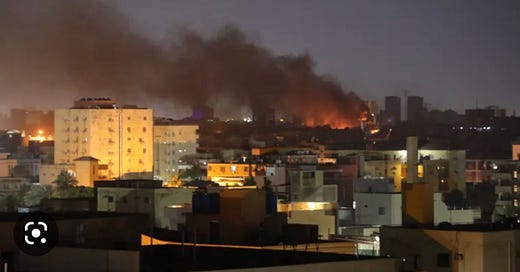Image: Screenshot from al-Jazeera
Open armed conflict erupted earlier this week between the Sudanese Armed Forces and the Rapid Support Forces, turning Khartoum into a devastating war zone. To help understand how Sudan got to this point, I invited Mai Hassan of MIT to talk through the political and institutional context. Hassan has a fantastic article coming out in the APSR about popular coordination during Sudan’s 2018-19 protests, and wrote one of the first and best accounts of that protest movement for the Journal of Democracy.
My conversation with Hassan focused particularly on the competing security institutions rather than the ongoing protest movement which is at this point mostly trying to survive and organize for mutual support in the face of indiscriminate shelling, armed looting, the unavailability of food and water, and generally terrifying conditions. She goes into considerable depth into the origins and nature of the competing forces, helping to make some sense of the confusing dynamics and the breakdown of cooperation between Hemedti (Mohamed Hamdan Dagalo) and SAF commander Abdel Fattah al-Burhan after their joint 2021 coup against the democratic transition.
Listen to my conversation with Mai Hassan here:
Hassan places the trigger for the breakdown in their conflicting views of security sector reform and the timing of elections in the internationally brokered transitional framework. Hemedti’s posing as a defender of democracy is difficult for most observers to stomach, given his lead role in the atrocities in Darfur and in the violent attacks on protest camps during the uprising. But the distinctive politics of Islamism in Sudan gives this a somewhat different spin. Hemedti’s anti-Islamist rhetoric, in line with the UAE’s outlook, plays out differently in Sudan than elsewhere in the region. Burhan and the SAF came out of the nominally Islamist former regime led by Omar al-Bashir, where Islamists occupied a wide swathe of key institutional positions across the government and the economy (see my review of Khalid Medani Mustafa’s book for more on that). As Hassan points out, Hemedti’s focus on anti-Islamism can resonate with the deep antipathy towards Bashir’s Islamist regime on the Sudanese street.
Hassan also critiques the international role in the Sudanese transition, particularly the failure of Western interlocutors and the UN to pay real attention to the localized, uncoordinated and informal popular movements. Their focus on negotiating with the military institutions and formal actors came at a serious cost. And then, of course, the role of external actors such as Egypt, Libya and the UAE has been consistently destructive — and, she warns, could become far worse if the conflict regionalizes. If the fighting settles down in Khartoum, she warns, it could spread out into other parts of the country and draw in regional powers such as Ethiopia or spill over into Chad and other neighbors.
Finally, here’s a few recent pieces worth reading: a masterful piece of reporting by Nesrine Malik; a sharp overview of Hemedti’s career by Alex de Waal; Declan Walsh on the two military leaders in the New York Times; and this piece by Kholood Khair is fantastic. For more background on how we got here, read my December interview with Raga Makawi…
….. and my review of the single best book on Sudan’s popular uprising and abortive transition, Willow Berridge, Justin Lynch, Raga Makawi and Alex de Waal’s Sudan’s Unfinished Democracy: The Promise and Betrayal of a People’s Revolution. I reviewed and discussed that outstanding book here:





